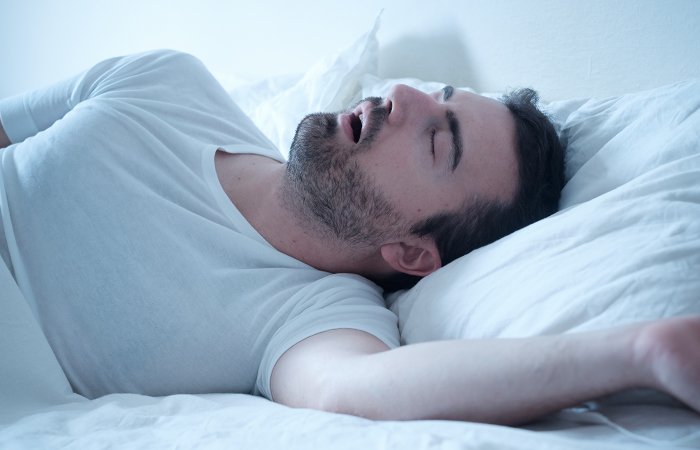Obstructive Sleep Apnea
When you’re sleeping the muscles that hold the throat open while you’re awake relax, narrowing the upper airway.

Snoring is caused by air being forced through the narrow passage. This airway can also be narrowed or obstructed due to large tonsils or tongue, a smaller than normal jaw or excessive tissue in the back of the throat.
Your brain senses when breathing is difficult and wakes you up to fully open the throat. You then breathe normally and begin to fall back to sleep. However, the airway narrows again reawakening your brain over and over again throughout the night. The awakenings are so brief you won’t remember them, although they will affect how rested you feel the next day.
Snoring can seem funny, but it's no laughing matter. It may be the symptom of a disorder called obstructive sleep apnea.
Warning signs of obstructive sleep apnea
- Loud snoring
- A pattern of snoring interrupted by pauses in breathing, snorts or gasps before breathing resumes
- Falling asleep inappropriately, such as at work, during movies or while driving
- Trouble concentrating, forgetfulness, irritability, depression, loss of interest in sex
- Headaches upon awakening
- Frequent nighttime urination or bedwetting
Effects of obstructive sleep apnea
- Increases your risk of heart attack, stroke or high blood pressure.
- Research shows there is also a high incidence of obstructive sleep apnea in patients with type 2 diabetes
- People with obstructive sleep apnea often say no matter how much sleep they get they never feel rested
Effects children as well as adults
- Children who are overweight or have large tonsils or adenoids are at risk.
- Symptoms in children may include snoring or difficulty breathing during sleep, fitful sleep, daytime hyperactivity (sleepy children often become fussy and overactive) and behavior or learning issues.
Treating obstructive sleep apnea
If you think you or someone you know suffers from obstructive sleep apnea, consult your provider or the HSHS St. Nicholas Regional Sleep Disorders Center to find out about having a sleep evaluation. The evaluation consists of a consultation with a sleep specialist and an overnight stay in a sleep lab where your sleep will be monitored. The sleep study will show if you have sleep apnea and help define the best treatment approach. Our Sleep Center colleagues will direct you through the process of getting started on a treatment plan if necessary. In many cases, the benefits of treatment are felt quickly after treatment begins. Some of those benefits include not snoring anymore and increased energy levels from getting a proper nights rest. In addition, risk of heart attack, stroke and high blood pressure are lowered.